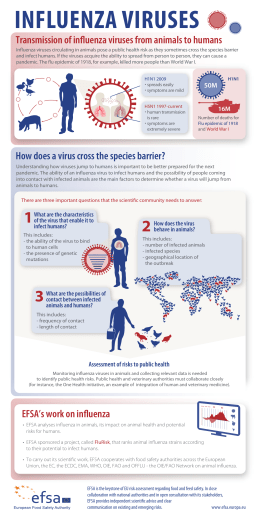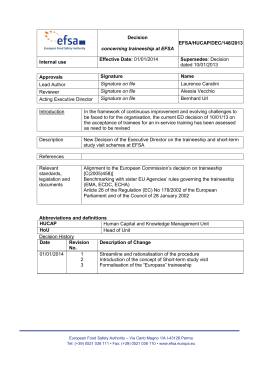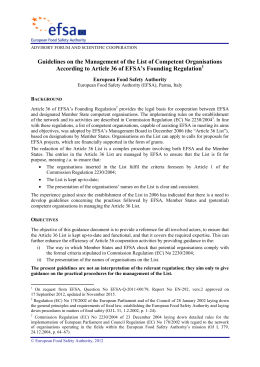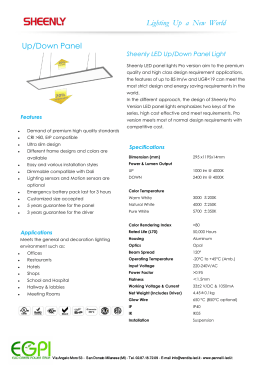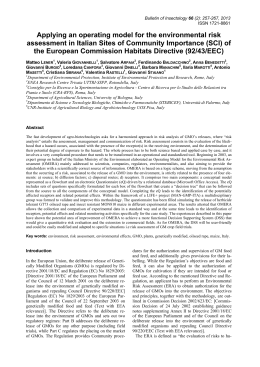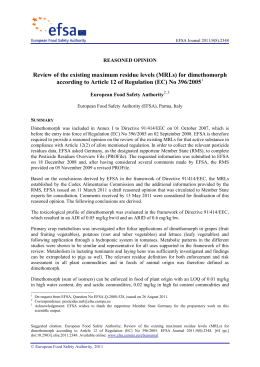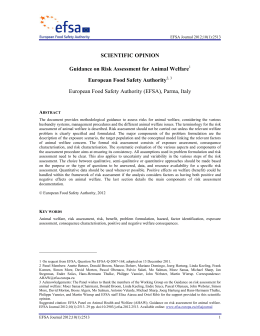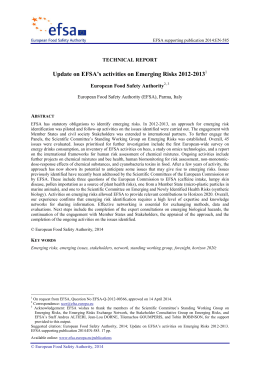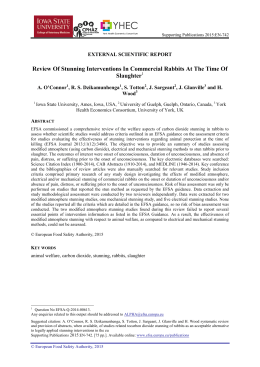TECHNICAL REPORT APPROVED: 16 April 2015 PUBLISHED: 20 April 2015 Response to comments on the Scientific Opinion of the EFSA Panel on Dietetic Products, Nutrition and Allergies (NDA) on the scientific substantiation of a health claim related to carbohydrate solutions and maintenance of physical performance during endurance exercise pursuant to Article 13(5) of Regulation (EC) No 1924/2006 European Food Safety Authority Abstract Following a request from the European Commission, EFSA was asked to address the scientific comments received on the Scientific Opinion of the EFSA Panel on Dietetic Products, Nutrition and Allergies (NDA) on the scientific substantiation of a health claim related to carbohydrate solutions and maintenance of physical performance during endurance exercise pursuant to Article 13(5) of Regulation (EC) No 1924/2006. Comments submitted to EFSA via the European Commission Services originated from the applicant (British Specialist Nutrition Association Ltd). The comments received were related to the comparative health claim, the scientific assessment of the meta-analyses, and the outcome measures. EFSA has reviewed the scientific comments and shared them with the chair of the NDA Panel and the chair of the NDA Working Group on Claims. In its opinion adopted on 18 September 2014, the NDA Panel concluded that a cause and effect relationship has not been established between the consumption of carbohydrate solutions and maintenance of physical performance during endurance exercise. The comments received do not require any change to the conclusions of the NDA Panel. © European Food Safety Authority, 2015 Key words: carbohydrate solutions, performance, endurance exercise, health claims, comments Requestor: European Commission Question number: EFSA-Q-2015-00009 Correspondence: [email protected] www.efsa.europa.eu/publications EFSA Supporting publication 2015:EN-797 Response to comments on the Scientific Opinion on the scientific substantiation of a health claim related to carbohydrate solutions and maintenance of physical performance Acknowledgements: EFSA wishes to thank: Ambroise Martin and Sean (J.J) Strain for the support provided to this output. Suggested citation: EFSA (European Food Safety Authority), 2015. Response to comments on the Scientific Opinion of the EFSA Panel on Dietetic Products, Nutrition and Allergies (NDA) on the scientific substantiation of a health claim related to carbohydrate solutions and maintenance of physical performance during endurance exercise pursuant to Article 13(5) of Regulation (EC) No 1924/2006. EFSA supporting publication 2015:EN-797. 6 pp. © European Food Safety Authority, 2015 www.efsa.europa.eu/publications 2 EFSA Supporting publication 2015:EN-797 Response to comments on the Scientific Opinion on the scientific substantiation of a health claim related to carbohydrate solutions and maintenance of physical performance Table of contents Abstract .........................................................................................................................................1 1. Introduction........................................................................................................................4 1.1. Background as provided by the European Commission ..........................................................4 1.2. Terms of Reference as provided by the European Commission ...............................................4 2. Consideration......................................................................................................................4 2.1. Comparative health claim ....................................................................................................5 2.2. Scientific assessment of the meta-analyses ...........................................................................5 2.3. Outcome measures .............................................................................................................5 3. Conclusions ........................................................................................................................6 Documentation provided to EFSA ....................................................................................................6 References .....................................................................................................................................6 www.efsa.europa.eu/publications 3 EFSA Supporting publication 2015:EN-797 Response to comments on the Scientific Opinion on the scientific substantiation of a health claim related to carbohydrate solutions and maintenance of physical performance 1. Introduction 1.1. Background as provided by the European Commission Article 16(6) of Regulation (EC) No 1924/2006 on nutrition and health claims states that: “The Authority, in accordance with Article 38(1) of Regulation (EC) No 178/2002, shall make its opinion public. The applicant or members of the public may make comments to the Commission within 30 days from such publication”. The Regulation does not foresee a consultation on the EFSA opinion. It does, however, allow for the applicant or members of the public to make comments to the Commission relating to the EFSA opinion. The Commission’s services have established a practice for handling the comments provided by applicants and members of the public in order to allow their full consideration by the regulators in the health claims’ authorisation process. More particularly, whenever the comments relate to the scientific assessment they are transmitted to EFSA for consideration. The Commission and the Member States await the EFSA response to the comments before proceeding with the final discussion and the vote in the Standing Committee on the Food Chain and Animal Health on the draft measure authorising or rejecting the health claims for which comments were made. The procedure briefly outlined above is in line with the procedure foreseen in Article 31 of Regulation (EC) No 178/2002, whereby the Authority may be requested by the Commission to provide scientific or technical assistance in any field within its mission, and when the matter does not require scientific evaluation by a Scientific Committee or a Scientific Panel. 1.2. Terms of Reference as provided by the European Commission The Commission requests EFSA, within the framework of scientific and technical assistance to the Commission foreseen in Article 31 of Regulation (EC) No 178/2002, to evaluate the comments of a scientific nature received by the Commission pursuant to Article 16(6) of Regulation (EC) No 1924/2006 and to provide the Commission with a response. Relevant actions performed under this mandate will be carried out in good cooperation between the Commission and EFSA in accordance with the procedure set out in the Annex to the Mandate (to be found in the EFSA Register of Questions under mandate number M-2011-0063). 2. Consideration On 18 September 2014, the EFSA Panel on Dietetic Products, Nutrition and Allergies (NDA) adopted a Scientific Opinion on the scientific substantiation of a health claim related to carbohydrate solutions and maintenance of physical performance during endurance exercise (EFSA NDA Panel, 2014) pursuant to Article 13(5) of Regulation (EC) No 1924/2006 1 following an application for authorisation from the British Specialist Nutrition Association Ltd submitted via the Competent Authority of the United Kingdom (Claim serial number: 0408_UK, Question No EFSA-Q-2014-00058). In accordance with Article 16 of Regulation (EC) No 1924/2006, the applicants or members of the public may make comments to the European Commission on opinions published by the Authority pursuant to Articles 16 and 18 of the Regulation. On 22 December 2014, the European Commission requested EFSA to respond to the scientific comments received during the commenting period specified in Article 16 of the Regulation. Comments submitted to EFSA via the European Commission Services originated from the applicant (British Specialist Nutrition Association Ltd). The comments received were related to the comparative health claim, the scientific assessment of the meta-analyses, and the outcome measures. In line with the Terms of Reference as provided by the European Commission, EFSA addressed the comments which were of a scientific nature. EFSA has reviewed the scientific comments and shared them with the chair of the NDA Panel, Professor Ambroise Martin, and the chair of the NDA Working Group on Claims, Professor Sean (J.J.) Strain. 1 Regulation (EC) No 1924/2006 of the European Parliament and of the Council of 20 December 2006 on nutrition and health claims made on foods. OJ L 404, 30.12.2006, p. 9–25. www.efsa.europa.eu/publications 4 EFSA Supporting publication 2015:EN-797 Response to comments on the Scientific Opinion on the scientific substantiation of a health claim related to carbohydrate solutions and maintenance of physical performance During this commenting period after the publication of the Scientific Opinion, the applicant cited some additional new references (i.e. not previously submitted), the review of which is out of the scope of this technical report. It is noted that only scientific comments on the published Scientific Opinion, i.e. on the studies evaluated in the opinion, are reviewed. New studies (i.e. evidence not previously submitted for the substantiation of the health claim) require an assessment by the Panel and, therefore, were not reviewed in this technical report. 2.1. Comparative health claim The applicant argued that the claim, which was the subject of the application, was not a “comparative” claim, as assessed by the Panel, but a claim on “carbohydrate solutions” per se. The applicant commented that, as the claim was on “carbohydrate solutions” only, no information was provided on the comparator. During the scientific assessment, EFSA requested clarifications from the applicant on whether the claim was a comparative claim (letter from EFSA dated 16 May 2014). In reply, the applicant indicated that the food/constituent, which was the subject of the health claim, was carbohydrate solutions (i.e. containing 50–80 g/L or 200 320 kcal/L of carbohydrates that induce high glycaemic responses, e.g. glucose, glucose polymers, sucrose) and that the comparator was “water” or “water plus electrolytes” (letter from the applicant dated 28 May 2014). Considering that for comparative claims the appropriate reference or comparator/food constituent should be characterised2, EFSA requested the applicant to fully characterise the comparator (i.e. “water plus electrolytes”) (letter from EFSA dated 16 May 2014). No information was provided on the comparator, as requested by EFSA during the scientific assessment. The comments received do not require any change to the conclusions of the NDA Panel. 2.2. Scientific assessment of the meta-analyses The applicant argued that, contrary to what it is expressed in the opinion, sufficient information was provided on the food that is the subject of the health claim in the individual studies included in the three meta-analyses which were submitted for the substantiation of the claim (Karelis et al. 2010; Temesi at al. 2011; Vandenbogaerde and Hopkins, 2011). The applicant also argued that a detailed analysis of the interventions, which were used in the individual studies included in the meta-analysis by Temesi at al. (2011), could have been provided to the Panel, if required. During the scientific assessment, EFSA requested the applicant to clarify how the foods that were investigated in each of the individual studies included in the three meta-analyses mentioned above, and the foods which were used as “control” or “placebo” related to the food that is the subject of the claim and to the food that is proposed as comparator (letter from EFSA dated 16 May 2014). In reply the applicant did not provide detailed indications on the type of interventions and “control” or “placebo” used in the individual studies in the three meta-analyses, but only indicated that the concentration of carbohydrates in the “carbohydrate solutions” used in the studies included in the meta-analysis by Temesi at al. (2011) was ≤ 8% (letter from the applicant dated 28 May 2014). Also considering that the comparator for the claim was not sufficiently characterised for a scientific assessment, the three meta-analyses provided by the applicant could not be used to substantiate the claim. The comments received do not require any change to the conclusions of the NDA Panel. 2.3. Outcome measures The applicant argued that “time to exhaustion” and “time trials” were appropriate outcome measures for a claim on “maintenance of performance”. The applicant also indicated that these two outcome measures were considered appropriate by the Panel in a previously adopted opinion for a claim on 2 EFSA Panel on Dietetic Products, Nutrition and Allergies (NDA), 2011. General guidance for stakeholders on the evaluation of Article 13.1, 13.5 and 14 health claims. EFSA Journal 2011;9(4):2135, 24 pp. doi:10.2903/j.efsa.2011.2135. Available online: www.efsa.europa.eu/efsajournal www.efsa.europa.eu/publications 5 EFSA Supporting publication 2015:EN-797 Response to comments on the Scientific Opinion on the scientific substantiation of a health claim related to carbohydrate solutions and maintenance of physical performance carbohydrate-electrolyte solutions and maintenance of endurance performance during prolonged endurance exercise (EFSA NDA Panel, 2011). As indicated in the guidance for health claims on physical performance3, the ability to complete certain physical tasks faster or with higher intensity are appropriate outcome measures for claims on physical performance, whereas “exercise time to fatigue” is an appropriate outcome measure for claims on endurance capacity. Thus, in the context of the claimed effect as proposed by the applicant (i.e. “maintenance of endurance performance during prolonged endurance exercise”), appropriate outcome measures are obtained from time-limited or task-limited physical activities during endurance exercise (one hour’s duration or longer). Likewise, the same outcome measures were indicated by the Panel in the opinion, which has been cited by the applicant, on maintenance of endurance performance during prolonged endurance exercise (i.e. ability of completing certain tasks with higher intensity, faster, or with a higher power output, when performing long-term exercise) (EFSA NDA Panel, 2011). The comments received do not require any change to the conclusions of the NDA Panel. 3. Conclusions In its opinion adopted on 18 September 2014, the EFSA Panel on Dietetic Products, Nutrition and Allergies (NDA) concluded that a cause and effect relationship has not been established between the consumption of carbohydrate solutions and maintenance of physical performance during endurance exercise. The comments received do not require any change to the conclusions of the NDA Panel. Documentation provided to EFSA 1. Comments submitted to the European Commission by the British Specialist Nutrition Association Ltd. References EFSA NDA Panel (EFSA Panel on Dietetic Products, Nutrition and Allergies), 2014. Scientific Opinion on the substantiation of a health claim related to carbohydrate solutions and maintenance of physical performance during endurance exercise pursuant to Article 13(5) of Regulation (EC) No 1924/2006. EFSA Journal 2014;12(10):3836, 6 pp. doi:10.2903/j.efsa.2014.3836 EFSA NDA Panel (EFSA Panel on Dietetic Products, Nutrition and Allergies), 2011. Scientific Opinion on the substantiation of health claims related to carbohydrate-electrolyte solutions and reduction in rated perceived exertion/effort during exercise (ID 460, 466, 467, 468), enhancement of water absorption during exercise (ID 314, 315, 316, 317, 319, 322, 325, 332, 408, 465, 473, 1168, 1574, 1593, 1618, 4302, 4309), and maintenance of endurance performance (ID 466, 469) pursuant to Article 13(1) of Regulation (EC) No 1924/2006. EFSA Journal 2011;9(6):2211, 29 pp. doi:10.2903/j.efsa.2011.2211 Karelis AD, Smith JW, Passe DH and Peronnet F, 2010. Carbohydrate administration and exercise performance: what are the potential mechanisms involved? Sports Medicine, 40, 747-763. Temesi J, Johnson NA, Raymond J, Burdon CA and O'Connor HT, 2011. Carbohydrate ingestion during endurance exercise improves performance in adults. Journal of Nutrition, 141, 890-897. Vandenbogaerde TJ and Hopkins WG, 2011. Effects of acute carbohydrate supplementation on endurance performance: a meta-analysis. Sports Medicine, 41, 773-792. 3 Guidance on the scientific requirements for health claims related to physical performance. EFSA Journal 2012;10(7):2817, 6 pp. doi:10.2903/j.efsa.2012.2817 www.efsa.europa.eu/publications 6 EFSA Supporting publication 2015:EN-797
Scaricare
